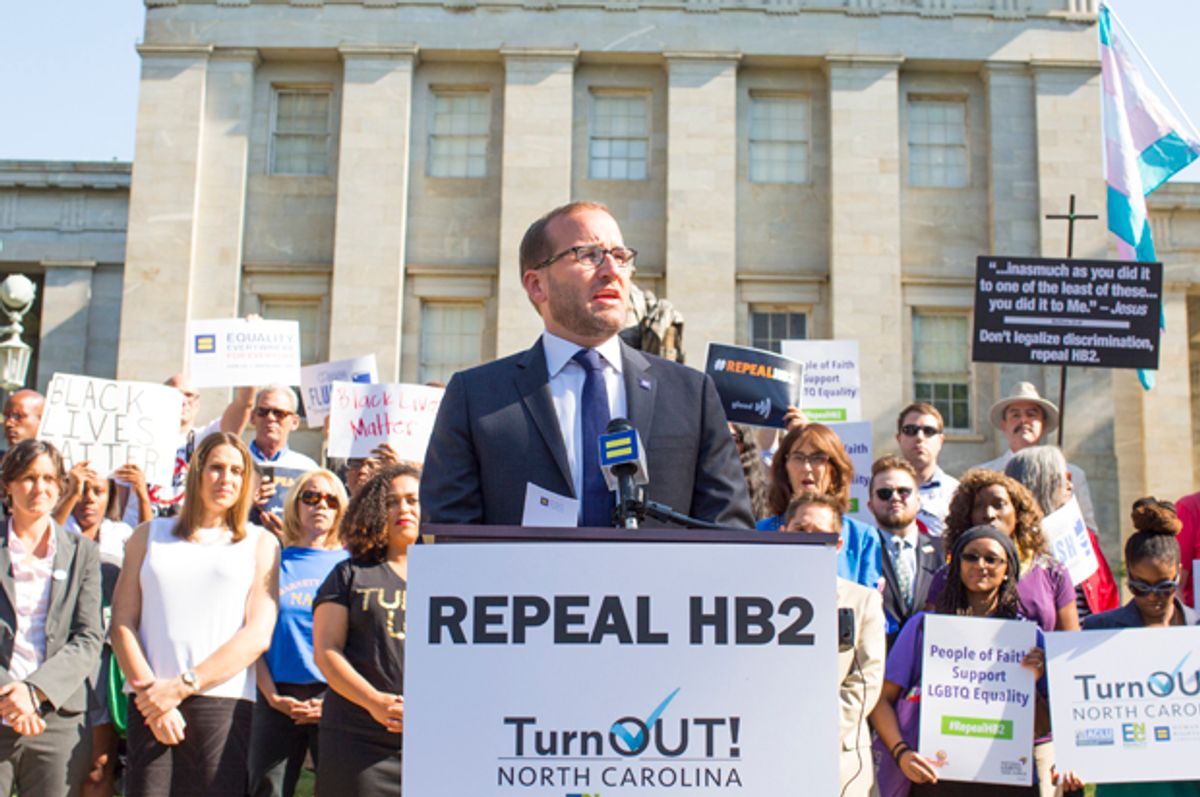Without any public mention beforehand, the Charlotte City Council on Monday voted 10-0, with one member absent, to rescind its controversial nondiscrimination ordinance. According to the Charlotte Observer, the surprise vote came after late-night lobbying Sunday by the incoming Democratic Governor-elect Roy Cooper, who has been battling a Republican effort to strip him of power since earlier this month when he officially defeated Republican incumbent Pat McCrory.
Cooper backed a repeal of the city ordinance as a compromise measure so as to negotiate a repeal of the state law banning such ordinances before a supermajority of Republican legislators assumes office in January. In exchange for the council's vote, McCrory said on Monday that he would call a special session to consider repeal of House Bill 2, the infamous "bathroom bill" that contributed to his political defeat and that invalidated Charlotte’s nondiscrimination ordinance.
In February, Charlotte, North Carolina, had passed a citywide anti-discrimination ordinance that amended the city's code to include sexual orientation, gender identity and gender expression to the list of protected characteristics in public accommodations rules. The ordinance had prohibited bars, restaurants, stores and taxis from discriminating against gay, lesbian and transgender people. It also enabled transgender people to use the bathroom that corresponds to their gender identity.
Then in March in response to Charlotte's nondiscrimination efforts a special legislative session passed the so-called bathroom bill. Throughout his campaign for governor, Cooper stressed the importance of repealing this controversial state law that keeps local governments from passing anti-discrimination ordinances and also restricts transgender people from using the bathroom that aligns with their gender identity.
After the city council's vote on Monday to repeal the anti-discrimination act, Cooper said in a statement that the Republican legislative leadership had “assured me that as a result of Charlotte’s vote, a special session will be called for Tuesday to repeal HB 2 in full.”
In his own statement, McCrory agreed to call the special session but also accused Democrats of using the HB2 issue for political gain. "This sudden reversal with little notice after the gubernatorial election sadly proves this entire issue originated by the political left was all about politics and winning the governor's race at the expense of Charlotte and our entire state," he said in a statement.
(After the Republican governor finally conceded in the gubernatorial race, a surprise session was called last week to strip Cooper of many of the powers McCrory had enjoyed while in office.)
While city leaders didn't have to repeal the anti-discrimination ordinance in order for the state's general assembly to repeal HB2, the council's move is contingent on North Carolina legislators repealing HB2 by Dec. 31. Previously, both Mayor Jennifer Roberts and the city council had declared that LGBTQ rights are non-negotiable and refused to compromise with the Republican-dominated legislature.
Since HB2 was signed into law, several NCAA and ACC championship games were moved from the state and rescheduled. The U.S. Justice Department also filed a suit to challenge the measure. Musicians Bruce Springsteen, Demi Lovato and Nick Jonas had canceled concerts in the state. PayPal and Deutsche Bank both said they would halt plans to expand in North Carolina. The estimated economic hit for Charlotte alone has been pegged at $500 million.
Gov.-elect Cooper has argued a "full repeal will help to bring jobs, sports, and entertainment events back, and will provide the opportunity for strong LGBT protections in our state."



Shares